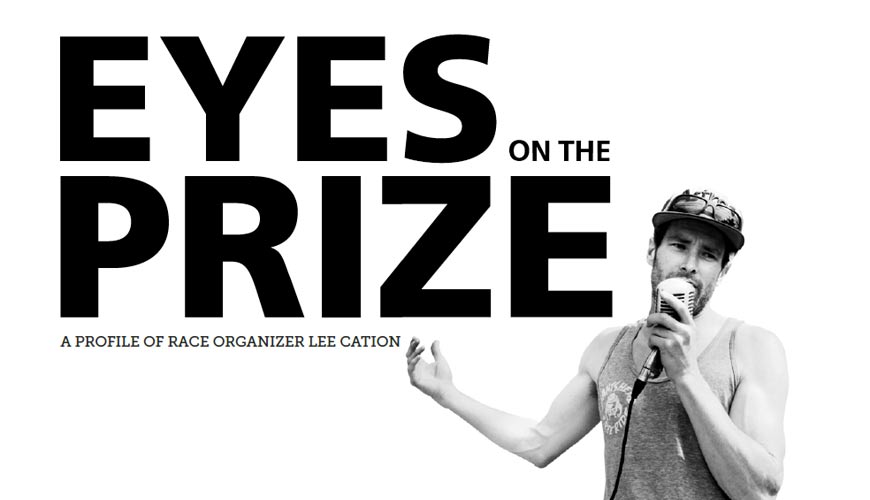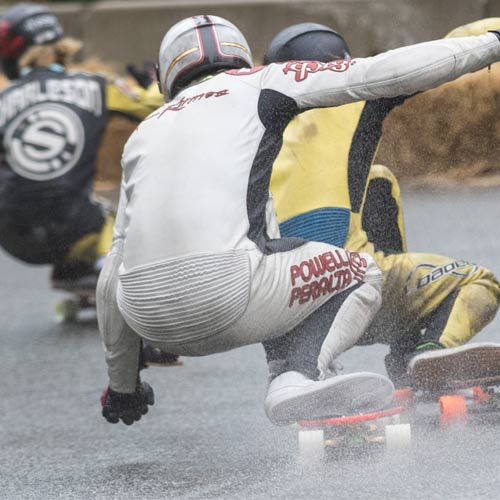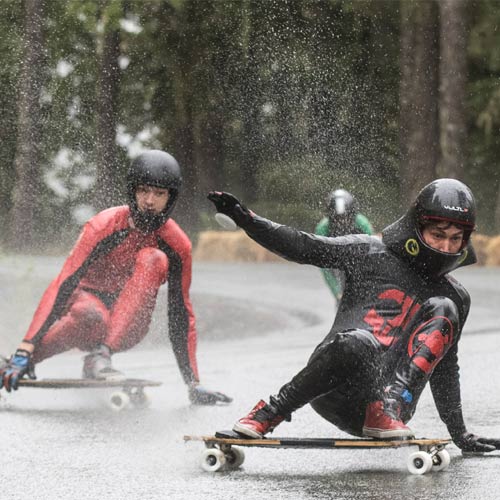 While many of us attend skate events, not many people consider what it’s like to actually be responsible for organizing and running them. We wanted to take you inside the mind of an event producer and explore what it’s like to face the challenge of hosting several hundred skateboarders in all conditions on a mountainside road, year after year.
While many of us attend skate events, not many people consider what it’s like to actually be responsible for organizing and running them. We wanted to take you inside the mind of an event producer and explore what it’s like to face the challenge of hosting several hundred skateboarders in all conditions on a mountainside road, year after year.
Lee Cation is a downhill skateboarding event producer living in Vancouver, British Columbia, Canada. You might have seen him on YouTube, scolding the police for using their vehicle to run him and his friends off the road. He specializes in organizing longboard events in British Columbia via his company, Unkle Events. His most wellknown events to date include the annual Whistler Longboard Festival, which just completed its fifth year, and the annual Britannia Classic, which is about to head into its ninth year. In addition to his work with Unkle Events, Lee is also a cofounder of the nonprofit International Downhill Federation (IDF) and is one of seven members of its board of directors.
As Lee sees it, hosting events is like hosting a big party and inviting all of your friends. “Your goal is for everyone to have a blast … and make sure the cops don’t show up!” Lee says. “I was always a host, even in high school. I lived across the road from my secondary school, so I’d have everyone over for a kegger party and some live music … during school hours.” Lee has two older brothers and says he was taught the art of hosting early on. “Hosting a downhill event is a little more complex than a party, but I still love getting everyone together for good time.”
Lee grew up in the flatlands of Caledon, Ontario, just north of Toronto, and spent time working on his grandparents’ farm. He had a Tommy Guerrero street deck when he was young and sometimes skated a mini ramp that belonged to a cousin, but otherwise there wasn’t much to skate in the country. However, “I had a dirt bike and I liked to snowboard. That hasn’t changed,” he says.
After high school, Lee moved about two hours down the highway to London, Ontario, to study the aviation business at the University of Western Ontario. “I was set on working in aviation and started down that path,” he says. “It turned out I didn’t fall in line with the union and found myself back at square one. My buddy was heading out west, and we made a plan to snowboard at the big mountains along the way.”
After making it to Vancouver, Lee says he was hooked by the geography and the climate. He ended up with a landscaping job to pay the bills, and in order to get to the different job sites, he started to borrow his roommate’s longboard. As he got more comfortable, Lee realized that if he carried his speed down the rolling Vancouver hills, he wouldn’t have to push up the other side. “I started to look into getting my own board and realized some of the best longboards in the world were made in Vancouver by young brands Landyachtz and Rayne,” he says. His first downhill event was Coast Longboarding’s Attack of Danger Bay in 2005, with Bricin “Striker” Lyons on the mic, and he found the vibe infectious.
Lee says his interest in producing events started when he began to host  outlaw races in Vancouver. After three or four great urban outlaws, Lee hosted a trial outlaw race in Britannia in 2006 with 10 friends. “I knew it was time for a new style of race, one that was steep and included drifting,” he says. “The next year I did a one-day, legal event.” Over time, Britannia evolved from two days to three days, and then in 2011 after months of meetings, documents and headaches, Lee finally landed Whistler and dove in headfirst on having a two-day event. The Whistler Longboard Festival eventually grew to four days, including a live video stream, skate-and-shoot biathlon and big-air competition, and then settled back down to three days in 2015.
outlaw races in Vancouver. After three or four great urban outlaws, Lee hosted a trial outlaw race in Britannia in 2006 with 10 friends. “I knew it was time for a new style of race, one that was steep and included drifting,” he says. “The next year I did a one-day, legal event.” Over time, Britannia evolved from two days to three days, and then in 2011 after months of meetings, documents and headaches, Lee finally landed Whistler and dove in headfirst on having a two-day event. The Whistler Longboard Festival eventually grew to four days, including a live video stream, skate-and-shoot biathlon and big-air competition, and then settled back down to three days in 2015.
When it comes to handling the pressure of dealing with things, Lee says his age and experience help. “When things are getting tough, I just always remind myself that all a downhill event really needs is a good road, an uplift, some hay bales and great people,” he says. “Everything else is a bonus. When things get tough, I focus on the big picture.”
Lee surrounds himself with people who have skills beyond his own and says none of it would be possible without the help and support of the downhill community. If something’s not working, he’ll readjust and try a different way, ask for some help from others or move on. “Sometimes it helps to move on and come back to the challenge when you have more energy,” he says. “Sometimes it can’t wait and you’ve just got to do your best.” He tries not to get too hung up if something isn’t going his way. “I enjoy a challenge and work best when the pressure is on, but at the end of the day I’m a big fan of the ‘Pareto Principle’ (the 80/20 rule),” i.e., 80 percent of problems are caused by 20 percent of the work.
Of course, it’s not all roses running an event, and Lee admits that he doesn’t always keep his cool. “Given our status as a ‘fringe activity’ in these tourism regions, we’re often forced into shoulder-season dates (spring/fall), and that can mean wet weather,” he says. “Rain on every day of my three-day event is frustrating. The event still goes on, but the smiles are smaller and the crowds dwindle.” Lee says it’s also really hard to make the event look like fun or to be a great marketing opportunity the following year when the visual media is all rainy and cloudy with little audience.
“We’ve had some wet ones. At the 2014 Britannia Classic we had almost a foot of rain over the three days and we got about half a foot at Whistler this year,” he says. Fortunately for Lee, a lot of the Northern and Northwest DH skaters like wet riding.
When asked what really causes a huge amount of stress, Lee says wet hay bales that are used for barrier protection are a major pain. “Setting up a burly track requires a lot of bales and a lot of manpower!” he says. Whistler requires about 1,000 hay bales, and Burke Mountain, Angie’s Curves and Pikes Peak need closer to 2,000. “Hay and straw absorb moisture like a tissue does, so when it rains your bales pack on the pounds,” he continues. “They can easily get 10 times heavier in rain! Even worse, the moment your hay or straw bales get wet or damp they become valueless.”
The other nightmare is when technology fails, which happened at Pikes Peak and Whistler 2013. “The IDF was working through some growing pains, and we had timer issues at 12,000 feet above sea level,” Lee says. He and his team had to seed the elimination brackets based on past IDF rankings and, thanks to some understanding and supportive people, the race went on and finished on a high note. “We learned a lot that year, and the timing equipment has become very reliable since,” he says. Still, he notes, “Everyone needs someone to blame, so I stepped forward. It was one of my darkest days. People get pissed when they are let down. I handled it by writing a very open and honest public apology post on the IDF website.”
“I enjoy a challenge and work best when the pressure is on…”
Lee says it’s really important to let all parties know the “why” when things go wrong. He notes that the downhill community is pretty reasonable and everyone understands things once you share the info. As an example he cites the 2013 live stream at Whistler. “It was tough because we were no longer on the riders’ schedule or even the IDF’s schedule; we were on the live stream schedule, and every second counted. We had to make some tough split-second decisions that year, which didn’t please everyone.”
Speaking of Whistler, Lee calls it a bit of a beast. “We went from being one  of their ‘Top Ten’ summer events to not getting a summer date at all, and to boot they increased our venue rental rate by 100%. Why? Well, Whistler is built on hotel revenue, and the town cringes a little when they see our tents and RVs roll into town.” Ever since the 2010 Winter Olympics, he says, Whistler has become the “Las Vegas of Mountain Resorts. They have the biggest events in the world there, including the top mountain bike, ski and snowboard, food, beer, music, yoga and adventure-race festivals. The Longboard Festival is pretty far down that list now. The time of year or timing of other festivals can increase your numbers or leave you with no options at all.”
of their ‘Top Ten’ summer events to not getting a summer date at all, and to boot they increased our venue rental rate by 100%. Why? Well, Whistler is built on hotel revenue, and the town cringes a little when they see our tents and RVs roll into town.” Ever since the 2010 Winter Olympics, he says, Whistler has become the “Las Vegas of Mountain Resorts. They have the biggest events in the world there, including the top mountain bike, ski and snowboard, food, beer, music, yoga and adventure-race festivals. The Longboard Festival is pretty far down that list now. The time of year or timing of other festivals can increase your numbers or leave you with no options at all.”
It is tough to balance one of the world’s biggest Olympic resorts with grassroots skating. There are many levels of stakeholders in Whistler, including the government, the mountain resort and the Whistler Sport Legacies (NFP sport group). “Each [has] to approve our annual plans,” Lee says. “At the Britannia Classic we need to balance the transportation authority, the community association, the health authority, the regional district and the local residents. We worked out a deal back in 2007 at Britannia that allows us to use the road once a year for an event; in exchange we agree not to heat out the hill outside of event hours. There is no security in downhill event planning; every year could be the last, and that uncertainty is a really hard, but an exciting part of what I’ve been doing.”
Despite all the risks and obstacles, Lee has made friends with some amazing people and been lucky to travel to some amazing places, including Europe, South America and South Africa, and he says the feeling of putting on a successful event is truly amazing. “It’s a high like no other. When you bring international riders to your region for the first time and they get to shred your hills and parks, it’s priceless. It’s a very special thing we do, and I wouldn’t change this path one bit.”
Lee says he sometimes loses the stoke when people think he’s hosting events for the wrong reasons. But he regains it by loading up his car with shredders and hitting the hills, saying there is no better way to spend time than to slay some mountains. “Working in a home office can bring on cabin fever,” he says, “so I look forward to the welcoming Friday 5 p.m. beers at the Landyachtz factory and getting to hang out with others who share the same stoke.”
Lee hints that he’s been working on hosting some less competitive and more inclusive events on some new hills in the future, possibly in spring 2016. Sun Peaks Resort in BC built a new “gravity track” that has the potential to host a great freeride event – like a smaller, more compact Giants Head with a ski lift back to the top. On the other end of the spectrum, Lee says he’s been working on a World Record Speed Invitational and trying to find a non-skate presenting partner. He’s got all necessary approvals for the third year in a row but won’t give it the green light until he lands a lead sponsor. He is even offering a 20% reward for anyone who brings in that big fish.
Finally, although race results can be important, Lee says the real competition these days is “How many runs did you get? How much time was spent skating instead of waiting?” As for the future, he says can’t control it and would rather not try to predict it. “It’s up to the groms to show us where we’re going,” he says. “I’m looking forward to what comes next, and in the meantime I’ll be sampling new locations and dreaming up new events.”
Thankyou to Michael Brooke and Concrete Wave Magazine
